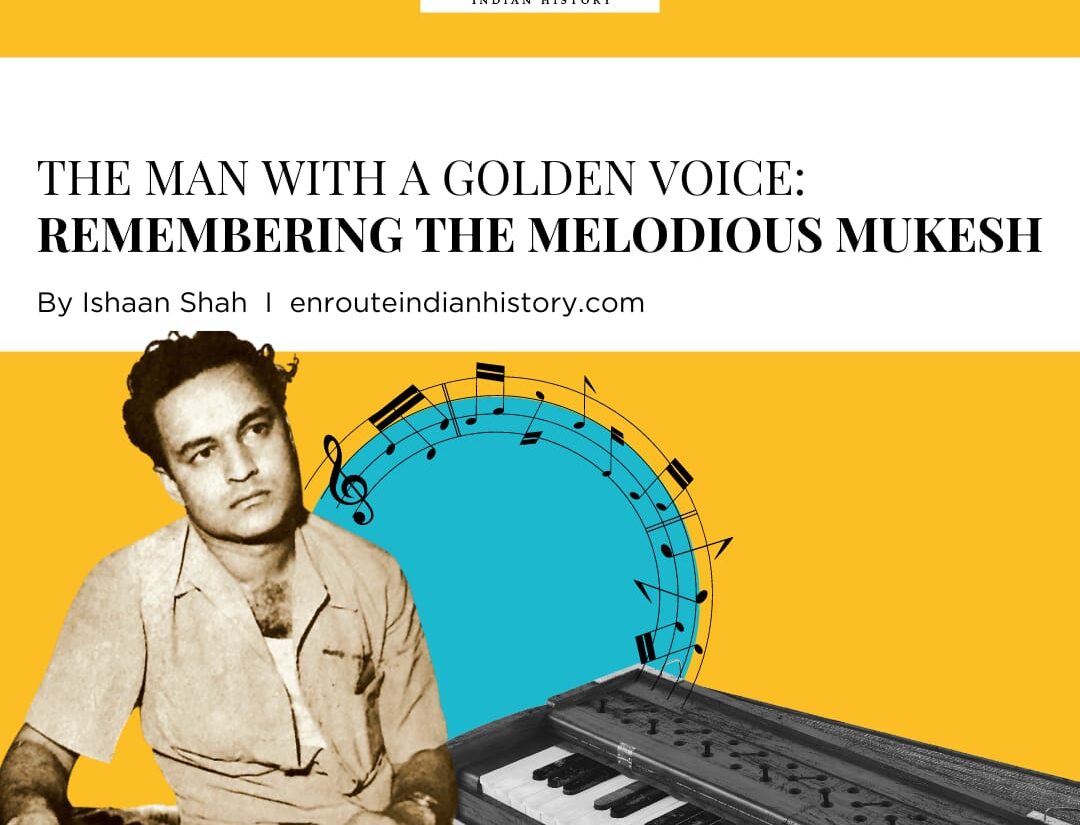
Delving into the world of Bollywood film music of the twentieth century, one cannot miss the legendary Mukesh, whose distinct voice enchanted the hearts and souls of many. Being one of the foremost Indian playback singers of his time, he gradually carved a niche for himself and became an acclaimed singer not only nationwide but also globally. The journey of this legend was an interesting one, right from being spotted singing by a celebrity at a wedding to soulfully singing more than 1,000 songs, that remain evergreen Bollywood songs of Mukesh, thereby leaving his fans mesmerized.
Playback singers today include several names, such as Arijit Singh and Shreya Ghoshal. But, it is essential to uphold the spirit of the evergreen songs, sung by legendary Bollywood playback singers of the mid to late twentieth century such as Kishore Kumar, Lata Mangeshkar, Manna Dey, and Mohammad Rafi. One name that features amongst these legends is Mukesh. Mukesh was passionate about singing right from his childhood, he would often listen to his sister’s Guru who used to come to teach her. What kickstarted his career was when the celebrity Motilal, also Mukesh’s distant relative, spotted him singing at the latter sister’s marriage and was quite impressed with his talent. Mukesh considered the singer KL Saigal his idol and would often mimic his style in his singing. Apart from lending his voice to stars of the time like Dilip Kumar, Mukesh also tried his hand at acting, but couldn’t find success. His journey was marked with various ups and downs but he was resilient and succeeded in carving his own space within the contours of Bollywood playback singing and being one of the Bollywood evergreen music legends. He sang majorly for star Raj Kapoor, whose voices were so similar that one could not distinguish when they were conversing! His personal life and how he married his love in 1946 were also engaging. Mukesh’s voice touched the hearts of many of them including ‘Awaara’ (Film- Awaara, 1951) and ‘Mera Joota Hai Japani’ (Film- Shree 420, 1955) earned him fame worldwide. These melodious songs, amongst many, sung in Mukesh’s golden voice reflect his distinct style and are still evergreen in the minds of his fans and family.

(Source- IMDB, Mukesh Chand Mathur)
EARLY LIFE
Born as Mukesh Chand Mathur, on 22nd July 1923 in Delhi belonged to a Mathur Kayastha family. His father, Zorawar Chand Mathur, was an engineer and his mother was Chand Rani. In a family of 10, he was the sixth child. It is said that since childhood, Mukesh loved to sing and act. As mentioned earlier, he would listen to his sister’s music teacher who would come to teach her, from the adjoining room. He studied only till 10th Standard and worked in the Department of Public Works, Delhi. It was here that young Mukesh experimented with a few voice recording tests and his singing abilities started to hone better after this. As already noted above, it was his distant relative and film celebrity of that time, Motilal, who noticed Mukesh’s talent and left a mark on him. The actor brought Mukesh, who was only 16, to Bombay and stayed with him. Mukesh then took singing lessons from Pandit Jagannath Prasad. It was his first film, Nirdosh (1941), wherein he acted and sang ‘Dil Hi Bujha Hua Ho’ for himself but the movie didn’t work well with the audience. Playback singing did not exist back then so the actors had to sing for themselves for their movies. However, one song was yet to come that would create waves among the audience and boost his career.
MUKESH’S PLAYBACK SINGING CAREER
The song that started his career of playback singing was Anil Biswas’s ‘Dil Jalta Hai to Jalna De’ (Film- Pehli Nazar, 1945). The movie coincidentally starred Motilal, who insisted that Mukesh be his voice in the film. The song was initially thought to be unsuitable for the character of Motilal and the song was removed from the film. After repeated requests, he gave away and agreed to keep the song for one week in the film, awaiting the reactions of the audience. The song became so popular that singer KL Saigal, Mukesh’s idol, declared that he did not remember singing this song. It was only after this that he was informed about a young

(Source- Tribune India, An old picture of Mukesh)
singer, Mukesh, who won the hearts of many singing this song.
Soon, Mukesh created his style of singing and initially sang for star Dilip Kumar such as ‘Tu Kahe Agar’, ‘Jhoom Jhoom Ke Nacho Aaj’, ‘Hum Aaj Kahin Dil Kho Baithe’ (all three from Film- Andaz, 1949). The voice of Raj Kapoor then was Muhammad Rafi. Mukesh sang more hits for Dilip Kumar like ‘ Jeevan Sapna Toot Gaya’ (Anokha Pyaar, 1948), ‘Gaye Ja Geet Milan Ke’ (Mela, 1948), ‘Dil Tadap Tadap Ke’ (Madhumati, 1958) until he started to sing for Raj Kapoor. However, Dilip Kumar still, suggested trying Mukesh, who had pathos in his voice, for ‘Yeh Mera Deewanapan Hai’ (Yahudi, 1958), after all other artists refused. It was then Dilip Kumar who chose Muhammad Rafi as his voice and Mukesh was roped in to be the voice of Raj Kapoor (the first movie being 1948’s Aag) picked by composer duo Shankar-Jaikishan. Mukesh-Raj became a fixated singer-actor duo among audiences from songs such as ‘Zinda Hoon Is Tarah’ & ‘Patli Kamar Tirchi Nazar’ (Barsaat, 1949), ‘Hum Tujhse Mohabbat Karke’ & ‘Awaara Hoon’ (this song, composed by Shankar-Jaikishan, was

(Source- Filmfare, Mukesh with Raj Kapoor)
translated into Russian and became a cult classic there- Awaara, 1951), ‘Aaja Re Ab Mera Dil Pukara’ (Aah, 1953), ‘Sab Kuch Seekha Hamnein’ and ‘Kisi Ki Muskurahaton Pe’ (Anari, 1959), ‘Mera Joota Hai Japani’ & ‘Ramaiya Vastavaiya’ (Shree 420, 1955), ‘Mera Naam Raju Gharana Anaam’ (Jis Desh me Gangaa Behti Hain, 1960), ‘Jaane Kahan Gaye Wo Din’ (Mera Naam Joker, 1970).
Apart from a professional relationship, they shared a beautiful personal bond as well, where Raj Kapoor was Mukesh’s true friend, who stood by him in any situation or circumstance. Mukesh’s son, also a singer, Nitin Mukesh shared in an interview that recording a Raj Kapoor or RK song meant jubilance and celebration where the recording party would be at Mukesh’s home. RK would arrive at midnight in his Impala dropping Mukesh and soon word would spread that ‘Raj Kapoor aaya hai’. Nitin Mukesh shares that RK would wake his mother up and would say ‘main khana khaonga’. He would call Nitin ‘Goldie baba’ and would shower children with so much love and gifts.
Apart from Raj Kapoor, Mukesh also sang for Dev Anand in Vidya (1948) and Shair (1949), under S.D Burman and Ghulam Mohammed respectively, in the 1940s. He also sang for Raj Kumar, Pradeep Kumar & Ashok Kumar. Being considered a lucky voice, he sang in the first films of stars like Dharmendra, Sanjeev Kumar, and Rishi Kapoor. He also sang for Rajesh Khanna in Raaz (1967), Anand (1971) and Raja Rani (1973).
Mukesh also acted in some films earlier such as ‘Aadab Arz’ (1943), ‘Aah’ (1953), ‘Mashuqa’ (1953), and produced‘Anuraag’ (1956), and ‘Malhar’ (1951). But he couldn’t find success, and in his own words in an interview with BBC in 1976, he remarked- ‘It is better to be a first-class singer than to be a second-class actor.’ All these films flopped at the box office. In an interview, his son, Nitin Mukesh shared that when he was in Class 5 and Rita was in Class 3, they were not allowed to attend school as Mukesh hadn’t paid their fees. The principal of the school sent them back home and Mukesh was horrified to see them.

(Source- Bollywood Hungama, Poster of Mukesh’s film ‘Anuraag’)
He was resilient under dire financial circumstances and emerged with ‘Yahudi’(1958). And then, he had many hits in films like ‘Kabhie Kabhie’, ‘Anand’, ‘Parvarish’ and ‘Madhumati’. He gained popularity across India and internationally as well as evident from his musical tours to the UK in 1972, Canada in 1976, and the United States in 1976. There was an amiable relationship between Mukesh and his contemporaries such as Kishore Kumar, Mohammad Rafi, Manna Dey, and Lata Mangeshkar. Mukesh called up his contemporaries to praise them for their singing and would say that he might not be able to sing in such a way. So, there was no rivalry or fierce competition between them. Mukesh was considered an elder brother in this group and he was closer to Lata Mangeshkar, whom Mukesh considered his younger sister Lata would affectionately call him ‘Mukesh bhaiyya’. One would think the best example of coordination between these legends would be a song from Amar Akbar Anthony (1977), that is ‘Humko Tumse Ho Gaya Hai Pyaar’, wherein the producer Manmohan Desai roped in Mukesh, Kishore Kumar, and Mohammad Rafi to sing for the three male leads and Lata Mangeshkar to sing for all three female leads.

(Source- IndiaTV News, Manmohan Desai (first from right) with musical legends Kishore Kumar (second from right), followed by Mukesh and Mohammad Rafi beside him, with the only female in the picture Lata Mangeshkar)
The official last recorded song of the legend was ‘Chanchal Sheetal Nirmal Komal’, composed by Laxmikant-Pyarelal from the film Satyam Shivam Sundaram (1978). However, his last songs were released for the TV Serial album, Chand Grahan in 1997 and these were ‘Tujhko Yoon Dekha Hai’ and ‘Tumhi Ne Dil Ko Dil’. These songs, composed by Jaidev, were used by the same producer for the serial, who made these two songs recorded for a movie that was never released. One of his last songs was also ‘Ek Din Bik Jaayega Ke Mol’ of the 1975 film Dharam Karam.
His accolades are worth mentioning. For the song ‘Kai Baar Yuhi Dekha Hai’ from Rajnigandha (1973), he won the National Film Award for Best Male Playback Singer. He won four Filmfare Awards for Anari’s ‘Sab Kuch Seekha Humne’(1959), Pehchaan’s ‘Sabse Bada Naadan Wahi Hai’ (1970), Beimaan’s ‘Jai Bolo Beimaan Ki’ (1972) and Kabhie Kabhie’s title song, ‘Kabhi Kabhi Mere Dil Mein’ (1976).
The iconic Bollywood playback singer Mukesh’s personal life was quite interesting enough!
HIS PERSONAL LIFE
Shedding light on his personal life, he loved an 18-year-old girl, Saral Trivedi, who was a Gujarati Brahmin, not touching onions or garlic. The alliance was not approved by the latter’s family as Mukesh was still ‘unsettled’ at that point, who was engaged in a ‘disreputable’ profession in the film business with an irregular source of income and marrying their daughter into a Mathur Kayastha family, where non-vegetarian is cooked and consumed, was unimaginable for the bride’s family. Saral was locked up in the room by her family. But finally, on 22nd July 1946 (also Mukesh’s birthday), they eloped and got married at a temple in Kandivali. This was possible as the bride was allowed to go to a Shiv Temple on a Monday and this time she went barefoot with mehendi applied. Mukesh would often sing ‘Chand Si Mehbooba Ho’ for his wife, Saral. (Himalaya Ki God Mein, 1965). The couple gave birth to two sons, Nitin and Mohnish, and three daughters, Namrata, Nalini, and Rita.

(Source- Chandrakantha.com, Mukesh with wife Saral)
Nitin Mukesh got emotional in an interview with BBC last year while sharing a heartfelt incident from his childhood related to his father. Once, Nitin wanted a car as all his college friends had cars. He demanded and asked for it from his mother, who then passed the word to Mukesh. Mukesh didn’t hesitate for a moment and gave his car keys to Nitin. Nitin then enjoyed driving his father’s car and one day, he saw his father, the legendary Mukesh, standing at the bus stop. He asked about this to him at home and Mukesh said that he would be more happy to see his son ride his car. Even though burdened with financial constraints at some time, Nitin added that his father never denied his children anything. He bought Nitin a bicycle when the latter demanded it as all the neighbor’s kids had one.
Mukesh’s voice expressed profound melancholy and it was his compassionate nature that added pathos to his voice. He would distribute blankets to the needy during winter. But he was not sad or depressed by nature but rather was the life of a party. Nitin remembers what his father taught him- firstly, it is essential to be a good human, and secondly to sing simply with your heart, without unnecessary tactics or harkat to showcase your skill.

(Source- Wikimedia Commons, Nitin Mukesh)
Nitin accompanied his father to Detroit in the United States for a concert, which was his first and the last time, unfortunately.
CELEBRATING THE LEGACY OF A MUSICAL LUMINARY
Mukesh was to perform with Lata Mangeshkar at a concert in Detroit, Michigan in the United States on 27th August 1976- who also celebrated 30 years of marriage and his 53rd birthday on 22nd July. But that morning he felt uneasy and complained of chest pains. While he was taken to a hospital in an ambulance, he remembered his mother and asked for his copy of Ramayana. It was on this unfortunate day that the legendary playback singer, Mukesh Chand Mathur, breathed his last after a massive heart attack. Nitin adds that he felt very helpless that day and shares that the heart attack was Mukesh’s fifth one.
Back home, the news came as a shock to the entire film fraternity as well as his family and friends. Raj Kapoor, who shared an amiable relationship with Mukesh, grieved inconsolably and said ‘I lost my life. I have lost my voice. I am the body but my soul was Mukesh.’

(Source- Wikimedia Commons, The legend features on 2016 postcard of the series ‘Legendary Singers of India’)
The spirit of Mukesh’s voice was kept alive in several remakes. Pop singer Anamika sang a remix form of Mukesh’s song ‘Kahin Karti Hogi Woh Mera Intezaar’ of Phir Kab Milogi (1974), composed by R.D. Burman and written by Majrooh Sultanpuri that was appreciated and loved by the younger generation. Interestingly, a Srilankan super hit ‘Meedum Selen Pawee’, sung by pop singers, Bathiya and Santhush in 2007, was based on the ‘Sawan Ka Mahina’ song of Mukesh-Lata duo, composed by the duo Laxmikant-Pyarelal, from Milan (1967). The latest recreation of his song is ‘Chhodo Kal Ki Baatein’ from the 2021 film Sooryavanshi by Tanishk Bagchi from Mukesh’s title track of the film Hum Hindustani (1960).
Last year, 2023, marked the birth centenary of this musical maestro who touched all souls with his heartwrenching renditions and soulful voice. As musical director Salil Chowdhury once praised the singer-
“Each word from his lips was a pearl. No one could sing the way Mukesh did, with the right diction, inflexion, and intonation. His vocal timbre was out of this world.”
Amidst upcoming musical genres and trends, honoring the legacy and paying tribute to such a musical luminary is essential to uphold the true essence of his voice, which expressed what true melancholy felt like in a variety of themes. Even though the world has bid farewell to this musical legend, his soul continues to echo in his classic Bollywood hits that have captured the hearts of his uncountable fans across the world.
REFERENCES AND BIBLIOGRAPHY
https://www.culturalindia.net/indian-music/indian-singers/mukesh.html
- Rohit (2014), Mukesh: Remembering the singer with the midas touch, Hindustan Times
Remembering Mukesh: The man with the golden voice (2016), Mid Day
Nitin Mukesh looks back at his late father Mukesh’s illustrious journey! (2018), Filmfare
Vijayakar. R (2023), Mukesh’s 100th birth anniversary: 10 rare facts about the voice of Raj Kapoor and Manoj Kumar, Bollywood Hungama
Courtney. D, Biography of Mukesh, Chandrakantha.com
https://chandrakantha.com/biodata/mukesh.html
Classic Legends- Season 3- Episode 5- Mukesh, Musical Duniya, Youtube
https://www.youtube.com/watch?v=1ZbYtotJGL8
Mukesh Singer : दिग्गज गायक मुकेश ने बताया कि उनके पिता उन्हें क्या बनाना चाहते थे… BBC ARCHIVE, BBC News Hindi, Youtube
https://www.youtube.com/watch?v=otqxuqdfGt8
Mukesh Singer : मुकेश के बेटे Nitin Mukesh ने बताया कि उस दौर में रफ़ी के साथ उनके कैसे रिश्ते थे, BBC News Hindi, Youtube
https://www.youtube.com/watch?v=gamaZdR3gNc
DD Morning Show | Shatayu Mukesh | Celebrating 100 Years of a Legend | 20th July 2023, Doordarshan National, Youtube
https://www.youtube.com/watch?v=94lvT3ZFuYg
Indian Idol S14 | Celebrating 100 Years Of Mukesh | Ep 20 | Full Episode | 10 Dec 2023, SET India, Youtube
https://www.youtube.com/watch?v=AqphcemhRq8&t=145s
IMAGE REFERENCES
https://m.imdb.com/name/nm0006715/mediaviewer/rm2436761600/?ref_=nm_ov_ph
https://www.bollywoodhungama.com/movie/anuraag/
https://commons.wikimedia.org/wiki/File:NitinMukesh.jpg
https://commons.wikimedia.org/wiki/File:Mukesh_2016_postcard_of_India.jpg

















